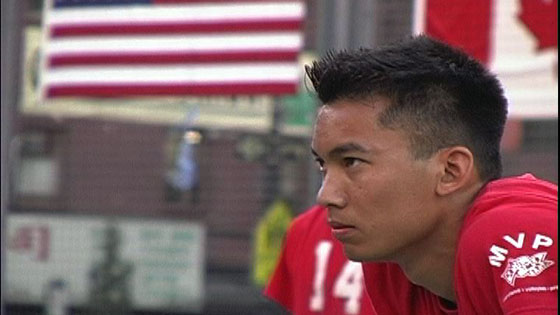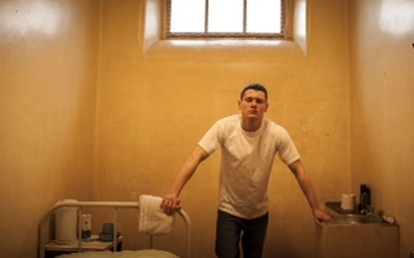9-Man
9-Man is an impressive, local filmmaking effort from Newton native Ursula Liang. It explores the history and culture behind 9-Man, a Chinese-only sport played on blacktops and basketball courts across North America, usually within the confines of the local Chinatown. Liang’s direction shows an excellent sense of timing, knowing how long to stay with each subject and at what moments to move on or back and forth. This task isn’t easy for a first time director, especially when her subject traverses the history of racism against Chinese people in America, explaining a complicated sport, exploring its historical roots across Canada and on both United States coasts on what must’ve been a low budget, and enjoying a fun sports tournament. I don’t imagine all viewers will have as much fun with 9-Man as I did, given my personal fascination with Chinese-Americans and east coast Chinatowns (Montreal and Boston particularly), but I hope they will because it’s a great documentary.
The game of 9-Man is a variation on volleyball. It has 9 players on each side, while volleyball only has 6. Given the increase in players on the court and culture of being a gritty outdoor game, 9-Man is more chaotic and thrilling to watch than ordinary volleyball. Entrenched in the sport is the tradition of Chinese Americans, who have long been persecuted in the United States. As a response to cultural racism in the late 1800s, Chinese men found solace in this sport. Being extremely poor, they could only afford a net and a ball made of crunched together towels, which they had easy access to as they often worked in laundry. This occupation required many to work long hours with heavy irons, which built up their wrist strength, making them perfect for a volleyball type sport.
The sport is almost exclusively for Chinese males. A certain amount of players must be 100% Chinese, and the rest must be at least partly Asian. Women are not allowed. An intriguing racial element enters the thematic fray of the film, as 9-Man has partly become the kind of exclusionary racist institution that forced Chinese men into the back alleys in the first place. This of course opens up the classic American debate amongst minority groups: do ethnic groups preserve their culture through exclusion (the same kind of exclusion that ghettoized them in the first place), or do they let others into their culture and risk it being diluted?
I’ve seen a lot of films that overtly discuss race and bring very little to the table in terms of new or evocative ideas. 9-Man brings out the difficulty of this debate in full force, merely by existing in that world and letting the viewer fall for its charms. By virtue of loving that world, you empathize with both sides of the debate.
9-Man is a strong documentary from a new, exciting voice in documentary cinema. It’s not going to change the world, but it does an excellent job documenting its topic. As is mostly only seen at festivals, documentaries can be just that. I’m glad to say that I’m very impressed by another world premiere at IFF Boston 2014. Don’t be surprised if you find me wandering around the blacktops of Chinatown looking for a 9-Man game; too bad I can’t play.
Grade: B+/A-
Vessel
Vessel is a stellar new documentary that explores the global injustice of restricted or limited access to abortion-related medical care. Director Diana Whitten focuses on Rebecca Gomperts and her organization Women on Waves, whose main initiative is to circumvent local anti-abortion laws by performing abortions on a ship in international waters. Since, in their opinion completely restricted or limited access to abortions is a global injustice, their aim is to help women escape situations that are bad for not only them but also the children. If you don’t support the legalization of abortions, this film will not convince you of anything; it’s most successful at exploring the current legal and social situations regarding abortion as they relate to the actions of Women on Waves.
In this regard, the plot of the film is kind of messy. At first we’re exploring legal abortions at sea. Then we’re looking at legal ways to help women give themselves safe abortions using legal pills. Then we’re looking at Women on Waves starting social protests that create awareness and put pressure on governments to legalize abortion. Then we watch them train doctors to safely give abortions in poor countries. Some viewers found this confusing and frustrating, as it’s sometimes unclear why we’re learning what we’re learning or what exactly Women on Waves does or doesn’t do; I can understand that perspective, but I think Whitten’s whirlwind exploration is exactly what it needs to be. This film isn’t completely about nautical abortions, Women on Waves or even Gomperts; it’s simply a survey of the current state of abortion politics in a sampling of countries. Given the highly charged emotions and intrigue of the topic, this survey method is effective and engrossing.
I found this documentary riveting, especially with Gomperts being a fun, intelligent leader guiding the charge. In very special moments, usually pertaining to letters that women have sent to Women on Waves, Whitten touches on the heart of the injustice. To hear of a woman’s pregnancy by rape is always extremely painful, but to then add that her culture will force her to keep the baby and then condemn her for it is tragic. Vessel is a well-made documentary that understands the deeper heart of its subject and reveals it to the viewer. It touched me and I can’t wait for it to be seen more widely when it receives distribution.
Grade: A-
Starred Up
Starred Up comes to IFF Boston as part of its long run of festivals. It premiered back in 2013 at Telluride and continues to play the circuit including Tribeca and IFFB right now. I wasn’t familiar with Scottish director David Mackenzie until this film, but it’s time to explore his back catalog because Starred Up is a brilliant film.
It takes place in Northern Ireland at an adult prison where a young violent offender named Eric Love has just been transferred. The film begins with his initial examination, in which they check his body for any illicit items. We see him walked through the prison to his wing, getting a feel for the colors, sounds, layout and general culture of the prison. This is clearly important to Mackenzie, who forms the identity of his characters using the setting (ah yes, your classic setting as character kind of film). There’s a cold heartlessness to the whole setup; these prisoners are pawns in a game, not people being rehabilitated.
Eric spends the film getting acquainted with his new situation. His father, who has been in prison for all of Eric’s life, is one of the inmates. Typical father/son relationship drama ensues. More intriguingly, Eric becomes part of a discussion group run by a renegade Oxford graduate who volunteers at the prison. In the group, prisoners talk about their feelings and learn how to control their aggression. This kind of pursuit can fail miserably in a film by feeling overwrought and unrealistic, but Mackenzie succeeds following the minutiae of his institutions as to how a circumstance such as this would unfold and, optimistically, could be successful.
Starred Up has the scents of something you’ve seen before, but don’t be fooled; Mackenzie is doing his own thing here. Even if the ideas and situations aren’t new, it feels like the realized vision of a visually articulate filmmaker. Structure and pacing combined with outstanding acting from the lead, Jack O’Connell, makes Starred Up an early highlight of IFF Boston.
Grade: A-



 RSS Feed
RSS Feed
